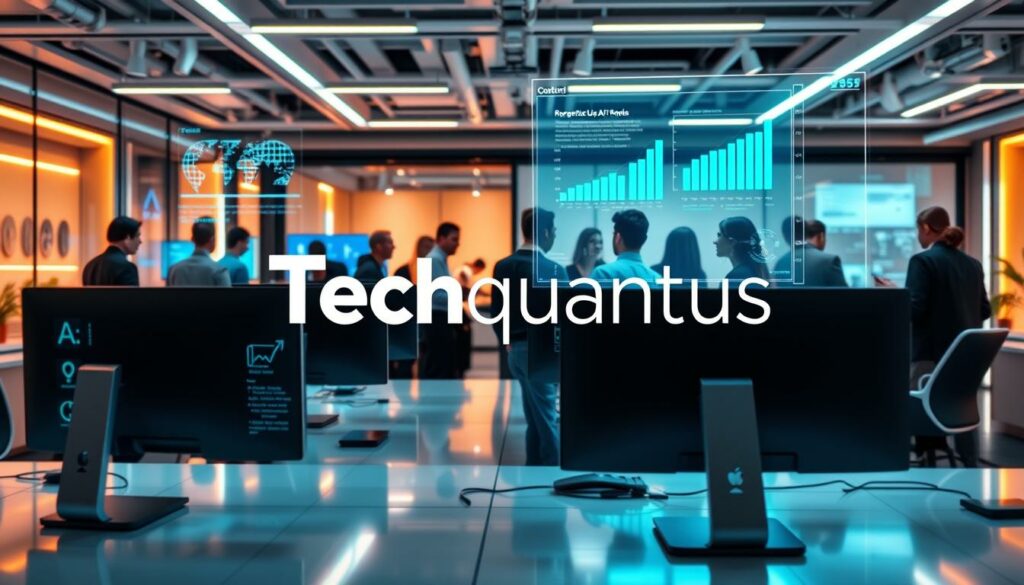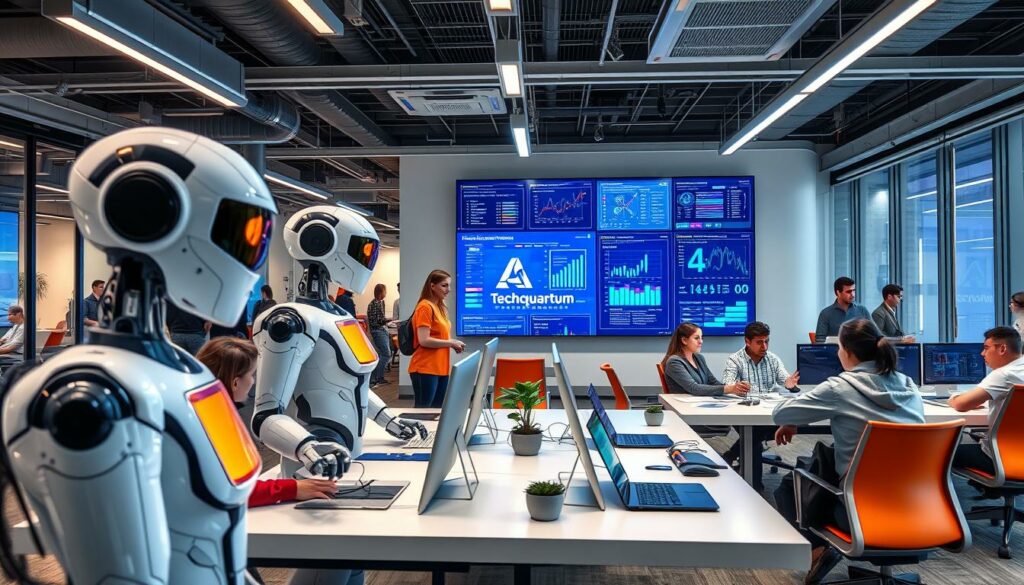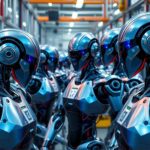Did you know AI could change up to 40% of jobs in the B2B sector? This shows how big the shift is in the job world as we welcome AI and Automation. We’re at the start of a big change, and knowing about the Future of Work is key. AI aims to make us work smarter and change how we see work.
Automation has grown from simple machines to advanced AI systems that can do complex tasks and come up with new ideas. As companies use these technologies more, it’s important for you to understand how they’ll affect your job. You should think about the skills you need and the new paths your career might take. Looking into how different sectors use AI and automation can help you get ready for the changing job scene.
Key Takeaways
- AI and automation will change 40% of jobs, especially in the B2B sector.
- Generative AI gives businesses an edge, boosting innovation and cutting costs.
- It’s key to understand AI integration to adapt to workforce changes.
- Companies are investing more in AI tech as they see its benefits.
- Workers need to get new skills to keep up in a more automated job market.
- Continuous learning will be key as AI changes business and the workforce.
The Evolution of Work in the Age of AI
AI and automation have changed the job world a lot. Now, more people work remotely or in the gig economy. These jobs use AI tools that make tasks easier and more efficient. This change is making old job models less relevant, offering both good and bad news for workers.
How Technology is Reshaping Employment
Technology is really changing how we work. With AI and automation, jobs need new skills. Workers must keep learning to stay ahead in the future of work. This means always learning new things to do well in an automated world.
Historical Context of Automation in the Workforce
Looking back at automation history helps us understand today’s work changes. Automation has grown from simple machines to complex AI systems over time. This growth has made work more efficient but has also led to job losses. Yet, new jobs are being created, showing that the workforce evolution will keep changing the job scene.
| Era | Key Developments | Impact on Employment |
|---|---|---|
| Industrial Revolution | Introduction of machinery | Shift from agriculture to factory work |
| Post-War Era | Rise of office jobs | Increase in clerical and administrative roles |
| Digital Age | Advent of computers and the internet | Growth of tech jobs and remote work |
| Current Era | AI and automation | Transition to gig economy and AI-enhanced roles |
Looking at the past helps us guess what the future will bring. By understanding trends and changes in the workforce, we can get ready for what’s next with AI and automation in the future of work.
For tips on adapting to tech changes, check out strategies for embracing AI in innovation
Understanding AI and Automation Technologies
The job world is changing fast because of new technology. It’s key to know the difference between AI and old automation. This helps us see how they change jobs in different fields.
Differentiating between AI and Traditional Automation
Old automation does repetitive tasks on its own. Machines follow set rules to do these tasks well. But AI is different because it thinks like humans, learns, and makes decisions. This means AI can make jobs better, not just replace them. Knowing the AI vs. Automation difference helps us plan for the future.
Key Technologies Driving AI Innovation
AI is changing the Future of Work thanks to key technologies:
- Machine Learning: Systems learn from data to make better predictions and decisions.
- Natural Language Processing: Makes computers talk like humans, improving how we interact with them.
- Robotics: Brings AI to machines, automating tasks from making things to helping in healthcare.
These AI Technologies are changing how we work. They make things more efficient and open up new ways of doing things. Knowing about these technologies helps us adjust and succeed in the changing job market.
AI and Automation: Transformative Impacts on Industries
AI and automation are changing many sectors, making them more efficient and improving customer happiness. Sectors like manufacturing, healthcare, finance, and retail are quickly adopting these technologies. By using AI, companies can make their processes smoother, cut costs, and innovate more.
Looking at how industries use AI gives us a peek into the changing world of work. It also shows us which skills will still be important in the future.
Industry-Specific Applications of AI and Automation
AI technologies help different industries adapt and grow. For instance:
- Manufacturing: Industry Automation has changed production lines with smart robots and predictive maintenance.
- Healthcare: AI helps with quicker diagnoses and tailored treatment plans, improving patient care.
- Finance: Automation tools help spot fraud and assess risks, making financial tasks more efficient.
- Retail: Better inventory management and customer data analysis boost sales and enhance customer experience.
Case Studies: Success Stories of AI Integration
Many companies show the real benefits of using AI. Here are a few examples:
| Company | Industry | AI Application | Results |
|---|---|---|---|
| Amazon | Retail | Supply Chain Management | Optimized delivery times and reduced operational costs. |
| IBM Watson | Healthcare | Diagnostic Tools | Improved accuracy in patient diagnoses and treatment recommendations. |
| Uber | Transportation | Dynamic Pricing Algorithms | Increased customer satisfaction through efficient pricing adjustments. |
These AI success stories show what technology can do. They also set standards for others to follow. As industries keep exploring AI, the job market will change. Workers will need to learn new skills to fit the future.
The Future of Job Automation
AI and automation are changing the job world in big ways. It’s important to know about Job Automation Risks as some jobs might change or disappear. Jobs in manufacturing, customer service, and transportation could see big changes. Knowing which jobs are at risk helps you plan for the future and get the right skills for new jobs.
Jobs at Risk: Understanding Vulnerable Positions
Many middle-skill jobs might be hit hard by automation. Here are a few examples:
- Manufacturing roles where robots can outperform human labor.
- Customer service positions increasingly supplemented by AI-driven chatbots.
- Transportation jobs facing automation through self-driving technology.
AI could affect up to 40% of jobs, both replacing and changing them. This means people need to be ready for changes in their careers.
Emerging Job Opportunities in an Automated World
Even as some jobs decline, new ones are emerging in AI and automation. Jobs like AI development, data analysis, and robotics maintenance are growing. Companies like Curious Refuge are training people for these new careers, helping hundreds every month.
The AI Filmmaking course from Curious Refuge is for writers and producers. It shows how AI helps, not replaces, creative jobs. Experts agree that AI is an aid, not a full replacement.
New jobs need special skills and training. It’s key to keep learning to adapt to the changing work world. As jobs evolve with AI, those who keep learning will do well. They’ll not just survive but thrive in an automated future.
| Current Vulnerable Jobs | Emerging Opportunities |
|---|---|
| Manufacturing Jobs | AI Development |
| Customer Service Representatives | Data Analysis |
| Transportation Roles | Robotics Maintenance |
| Administrative Jobs | AI Training Specialists |
Workforce Adaptation to New Technologies
AI and automation are changing the job world fast. To keep up, getting the right Future Skills is crucial. You’ll need skills in AI and Automation to be ready for new jobs. Knowing what skills are in demand helps you grow in both your career and personal life.
Essential Skills for Future Employment
With technology changing, some skills will be more valuable in the job market:
- Technical Acumen: Knowing about AI and data analytics will make you stand out.
- Emotional Intelligence: As machines take over, employers will look for people who can work well with others.
- Problem-Solving Abilities: Being able to think creatively and solve problems will be key in a world with more automation.
The Importance of Lifelong Learning in the Workforce
With jobs changing all the time, Lifelong Learning is a must. It helps you stay relevant in the job market. Here are some ways to keep learning:
- Online Courses: Sites like Coursera and edX let you learn at your own pace.
- Certifications: Getting special certifications can boost your skills and show you’re serious about growing in your career.
- Professional Development Initiatives: Many companies offer training programs on new tech.
Staying ahead in your learning means you’re ready for the changes brought by AI and automation. This prepares you for both the challenges and the new chances that come your way.
The Role of Generative AI in Business Growth
Generative AI is changing the game for businesses looking to grow and innovate. It helps companies automate tasks and boost creativity. This leads to a big edge over competitors.
Generative AI helps create new business models. It lets companies improve what they offer and come up with new ideas. These ideas match what customers want and keep up with tech advances.
Creating Competitive Advantages through Intelligent Automation
Using Generative AI, businesses can work more efficiently and save money. This tech is key for innovation. It’s why venture capital firms and traditional companies are investing more in it.
Companies that use this tech see better customer relationships. They offer personalized experiences, making customers more loyal.
Innovative Business Models Powered by AI
AI is bringing new business models to life. Services based on subscriptions and on-demand are great examples. They show how companies can adjust to market changes.
TotalEnergies just put $100 million into sustainable forestry. This shows a big push for long-term value and caring for the environment. It’s part of a bigger trend using AI for sustainable business practices.

Challenges and Risks of AI and Automation
AI and automation are becoming more common in the workplace. This brings many challenges and risks. These include ethical issues and big worries about jobs. It’s important to understand these challenges for a better future of work.
Ethical Considerations in Automation Practices
AI Ethics is key in setting rules for automation. Societies face problems because AI can be biased. Companies must follow rules to gain trust from people.
- Bias and Discrimination: Algorithms can keep old inequalities going, so we must watch closely.
- Privacy Concerns: Collecting personal data makes people wonder about consent and keeping data safe.
- Transparency Issues: It’s hard for people and businesses to understand how AI makes decisions.
Addressing Job Displacement Concerns
Automation is changing many jobs fast, causing worry about losing jobs. We need to act to lessen these effects. Governments and companies must come up with plans to help.
| Strategy | Description | Potential Benefits |
|---|---|---|
| Workforce Retraining Initiatives | Programs aimed at reskilling workers to meet new demands in an automated economy. | Leads to greater job security and adaptability within the workforce. |
| Improved Safety Nets | Social protections for displaced workers, providing financial support during transitions. | Enhances stability while individuals re-enter the job market. |
| Collaborative Efforts | Partnerships between businesses and educational institutions to align skills with market needs. | Ensures a continuously evolving skillset among the workforce, mitigating job displacement risks. |
Strategies for Successful AI Adoption in the Workplace
To make the most of AI, companies need to use smart AI Implementation Strategies. These strategies help boost productivity and efficiency. It’s important to plan well, test with pilot programs, and check how they meet company goals. Learning these methods helps you understand AI better and get ready for the future of work.
Best Practices for Implementing AI Technologies
For AI to work well, it needs a careful plan. Here are some top tips:
- Start with pilot programs to test AI tools in a controlled setting.
- Work together across departments to use everyone’s unique insights.
- Regularly check and update AI systems to keep them in line with your business needs.
- Offer ongoing training and support for employees to help them feel confident with AI.
Collaboration between Humans and Machines
Adding AI to the workplace shows how key Human-Machine Collaboration is. Working well together can really boost productivity. This teamwork needs smooth workflow and strong communication.
By using human skills and machine power together, your company can create a place where innovation and success go hand in hand.

Conclusion
Looking ahead, AI and automation will change our work lives more and more. This summary of AI and Automation shows how they’re changing jobs and driving new ideas in many fields.
Generative AI is a key part of this change. It helps businesses automate simple tasks and cut costs. With 75% of marketers expecting big changes from AI, the future workforce is set for a big shift. To keep up, it’s important to keep learning new skills and plan your career carefully.
In the future, using smart automation tools will make work more efficient and help companies quickly adjust to new trends. By understanding what generative AI offers, you can get ahead in a tech-driven workplace. It’s key to handle the challenges and grab the chances that come with these changes.
FAQ
What are the primary differences between AI and traditional automation?
Traditional automation is about machines doing the same tasks over and over. AI, on the other hand, uses intelligence to learn, adapt, and make decisions. This lets it handle a wider range of tasks.
How is automation transforming job opportunities across industries?
Automation might replace some jobs in areas like manufacturing and customer service. But, it also opens up new roles in fields like AI development, data analysis, and robotics maintenance.
What skills will be in demand in the future workforce influenced by AI and automation?
The future will need skills in AI technologies, emotional intelligence, and problem-solving. These skills will make you more valuable in an automated job market.
How can I prepare for potential job displacement due to automation?
Know which jobs might be at risk. Then, learn new skills, join retraining programs, and look into emerging careers thanks to technology.
What role does generative AI play in business innovation?
Generative AI boosts creativity and efficiency in businesses. It helps companies stand out by offering smart solutions that meet market needs.
What are some ethical concerns related to the rise of AI and automation?
Concerns include bias, privacy, and transparency issues. These need strong rules to make sure AI is used right in the workplace.
How can lifelong learning contribute to maintaining job readiness in an evolving job market?
Keep learning with online courses, certifications, and professional development. This will keep you ahead in the industry and make you more employable.
What best practices should companies adopt for successful AI integration?
Companies should start with pilot programs, work together across departments, and regularly check how AI systems work. This ensures they meet company goals and help employees work well together.
How can collaboration between humans and machines enhance productivity?
Working together, humans and machines can improve workflows and communication. This leads to better productivity in the workplace.
What future career paths are likely to emerge as a result of AI and automation?
Careers in AI development, data science, and robotics maintenance are expected to grow. People should get the right skills and training to fit these new roles.
Source Links
- Investing in Generative AI: Is It a Smart Move?
- Future of B2B Workforce and AI in Upskilling Talent and Adapting to Automation
- Single Board Computer Market Set to Worth Over USD 7,486.1 Million By 2032 | Astute Analytica
- ‘The Hidden Present’: Time and Eschatology in Jean-Yves Lacoste
- Identification of Osteosarcopenia by High-Resolution Peripheral Quantitative Computed Tomography
- How CEOs can rewrite their organisational playbook for the AI era
- ‘Get to know your enemy.’ How Hollywood workers are learning to use AI
- Smart Irrigation Controllers Market to Reach USD 5.23 Billion by 2032, Driven by Technologies to Optimize Water Usage in Agricultural Activities | SNS Insider
- TotalEnergies Invests $100M in Sustainable Forestry to Boost Carbon Sequestration – ESG News
- GenAI in Cybersecurity: A Double-Edged Sword for Defence and Offense
- iACCEL GBI Partners with Angels Den Funding to Expand into UK and Europe
- Confusion on Digital Transformation Risk to SME Manufacturers
- Top 10 Latest Trends in AI Development For 2024
- Budgeting and Cost Control for IT Projects: My Expert Advice
- Learn How to Manage IT Projects Effectively with My Advice
- I Share My Best Data Backup Strategies Using Cloud Storage
- I Learned About AI Mistakes That Could Change Your Life
- Sustainable & Green Energy Solutions for Next‑Gen Data Centers Trend Report
Related posts:
 AI in Cybersecurity: The New Frontier in Protecting Data
AI in Cybersecurity: The New Frontier in Protecting Data
 Big Data Meets AI: Transforming Business Decision-Making
Big Data Meets AI: Transforming Business Decision-Making
 AI-Powered Robots: The Next Step in Automation
AI-Powered Robots: The Next Step in Automation
 Artificial Intelligence in IT Operations (AIOps): What’s Next?
Artificial Intelligence in IT Operations (AIOps): What’s Next?
 Quantum Computing in Artificial Intelligence: The Next Frontier
Quantum Computing in Artificial Intelligence: The Next Frontier
 I am Uncovering How AI is Fooling the World
I am Uncovering How AI is Fooling the World
